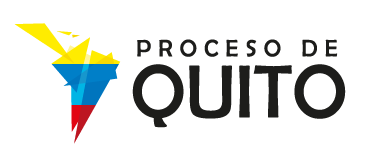What We Do?
WHAT
WE DO?
Origins of
the Quito Process
In September 2018, at the initiative of the government of Ecuador, representatives from 13 countries met in Quito. The main purpose of that meeting was to exchange information on the situation in each country and, incidentally, articulate a regional strategy to address the crisis of Venezuelan refugees and migrants.
The region was experiencing a sustained increase in human mobility from Venezuela, which forced countries to seek solutions. The overflow of the institutional response’s capacity in each countries that received a greater impact on the migratory flow from Venezuela led to the beginning of the Quito Process.
This initiative was born, above all, as a roundtable whose priority was to deepen the mechanisms to serve Venezuelan refugees and migrants, as well as to seek ways to strengthen international financial cooperation and also to generate institutional articulation among member countries.
What is
the Quito Process?
The Quito Process is the name given to the meetings and commitments established between Latin American countries to coordinate the response to the Venezuelan migration crisis.
The first meeting was held in Quito, Ecuador, on September 3rd and 4th, 2018, to "exchange information and good practices, seeking to articulate regional coordination with respect to the migration crisis of Venezuelan citizens in the region."
During the meeting, Argentina, Brazil, Chile, Colombia, Costa Rica, Ecuador, Mexico, Panama, Paraguay, Peru and Uruguay signed the “Quito Declaration on Human Mobility of Venezuelan Citizens in the Region”, an 18-point manifesto of will , which is not mandatory for nations, but urges countries, among other measures, to reinforce reception policies for Venezuelan migrants; coordinate efforts through international organizations; fight discrimination, intolerance and xenophobia; strengthen regulations to promote and respect the rights of migrants; strengthen the role of CAN and MERCOSUR to address the flow of Venezuelan nationals in a comprehensive and coordinated manner; the meeting also issued a call to the Venezuelan government, though they did not attend the meeting, to accept the cooperation of the region’s governments.
Response to the region’s
greater migratory flow
The phenomenon of human mobility of Venezuelan citizens has overwhelmed the institutional response capacity of the countries that have been most impacted by the flow of refugees and migrants, one that goes beyond neighboring countries.
The increase in the flow of Venezuelan refugees and migrants in the region, one of the largest in the world, has challenged the institutional response capacity of the recipient countries of Latin America and the Caribbean. Due to the acute crisis of human mobility from Venezuela, every day the exodus of nationals of that country increases, in what, in addition, constitutes the largest migratory flow in Latin America in the last 50 years
First Declaration of the Quito Process
The Quito Declaration, carried out on September 3rd and 4th, 2018, committed the signatories to "accept expired travel documents as identity documents of Venezuelan citizens for immigration purposes", in order to facilitate the movement of people. He also urged Caracas to take the "necessary measures for the timely provision of identity and travel documents for its nationals.”
The Quito Declaration on mobility of Venezuelan citizens in the region was the final product of the meeting of representatives of the Governments of Argentina, Brazil, Chile, Colombia, Costa Rica, Ecuador, Mexico, Panama, Paraguay, Peru and Uruguay.
A second meeting was held on November 22 and 23, 2018 to follow up on what was agreed in the “Declaration of Quito” and approve an action plan.
What was the initial Action Plan of the Quito Process?
The action plan approved in the second technical meeting included working in three areas:
Its objective has been to promote measures, in accordance with the legislation of each country, to normalize the migratory status of Venezuelan nationals; the activation of a technological platform to exchange information through coordination between the migration authorities of the countries; the gathering and evaluation of updated information on migration processes; the establishment of procedures and protocols to guarantee the rights of the Venezuelan population in matters of human mobility, especially for those most vulnerable, in a coordinated manner, with the institutions responsible for economic and social inclusion.
This approach was born with the objective of conversing with the Venezuelan Government to identify mechanisms of humanitarian assistance for Venezuelan and foreign nationals living in Venezuela. Likewise, it sought to strengthen consular relations between the countries that signed the Declaration of Quito with the intention of diagnosing and evaluating the priority needs of migrants and possible joint actions.
It sought to activate international cooperation on different fronts, through international organizations. Among others, it proposes to establish a regional program for the exchange of information on the migration of Venezuelan citizens; identify possible joint regional actions on issues such as discrimination, intolerance and xenophobia, care for children and adolescents and human trafficking; study the possible financing of multilateral banks for the development of public policies in the short, medium and long term; and study and implement labor insertion policies, among others.




